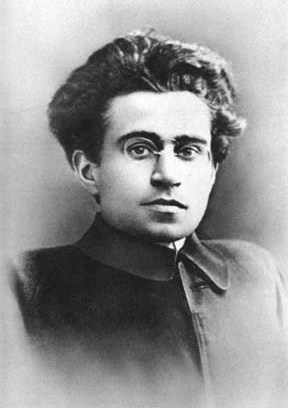More languages
More actions
(Created.) Tag: Visual edit |
No edit summary Tag: Visual edit |
||
| Line 2: | Line 2: | ||
'''Antonio Gramsci''' was an Italian communist and one of the founders of the [[Italian Communist Party]]. In 1926, he was imprisoned by [[Benito Mussolini]] and died in prison in 1937 due to a mix of several health problems.<ref>{{Citation|author=Antonio Gramsci|year=1971|title=Selections from the Prison Notebooks|chapter=Introduction|page=xvii–xcvi|city=New York City|publisher=International Publishers|isbn=071780397X|title-url=https://books.google.com/books?id=z4vFJ-3jh6sC&dq=isbn:071780397X&hl=de&sa=X&ved=2ahUKEwi0otjLgsj1AhXckWoFHYfEBVcQ6AF6BAgCEAI}}</ref> | '''Antonio Gramsci''' was an Italian communist and one of the founders of the [[Italian Communist Party]]. In 1926, he was imprisoned by [[Benito Mussolini]] and died in prison in 1937 due to a mix of several health problems.<ref>{{Citation|author=Antonio Gramsci|year=1971|title=Selections from the Prison Notebooks|chapter=Introduction|page=xvii–xcvi|city=New York City|publisher=International Publishers|isbn=071780397X|title-url=https://books.google.com/books?id=z4vFJ-3jh6sC&dq=isbn:071780397X&hl=de&sa=X&ved=2ahUKEwi0otjLgsj1AhXckWoFHYfEBVcQ6AF6BAgCEAI}}</ref> | ||
== Political career == | |||
Antonio Gramsci joined the [[Italian Socialist Party]] in 1913. In 1919, he founded a socialist newspaper called ''L'Ordine Nuovo''. In 1921, he founded the Italian Communist Party in Livorno and participated in several [[Communist International (1919–1943)|Comintern]] meetings in the 1920s.<ref name=":0">{{News citation|author=Nicholas Stender|newspaper=[[Liberation School]]|title=Antonio Gramsci: A communist revolutionary, organizer, and theorist|date=2021-01-01|url=https://www.liberationschool.org/antonio-gramsci/|archive-url=https://web.archive.org/web/20220122170247/https://www.liberationschool.org/antonio-gramsci/|archive-date=2022-01-22|retrieved=2022-06-24}}</ref> | |||
== Political positions == | |||
Gramsci believed that trade unions tended towards [[reformism]]. Instead, he preferred factory councils that were similar to the [[Soviet (governmental body)|Soviets]] in [[Russian Empire (1721–1917)|Russia]], which formed [[Dual Power|dual power]] against the bourgeois state. Gramsci also advocated for workers to educate each other on the job and train cadres to popularize [[scientific socialism]].<ref name=":0" /> | |||
== References == | == References == | ||
[[Category:Communists]] | [[Category:Communists]] | ||
Revision as of 18:31, 24 June 2022
Antonio Gramsci | |
|---|---|
 | |
| Born | 22 January 1891 Ales, Sardinia, Italy |
| Died | 27 April 1937 Rome, Italy |
| Nationality | Italian |
Antonio Gramsci was an Italian communist and one of the founders of the Italian Communist Party. In 1926, he was imprisoned by Benito Mussolini and died in prison in 1937 due to a mix of several health problems.[1]
Political career
Antonio Gramsci joined the Italian Socialist Party in 1913. In 1919, he founded a socialist newspaper called L'Ordine Nuovo. In 1921, he founded the Italian Communist Party in Livorno and participated in several Comintern meetings in the 1920s.[2]
Political positions
Gramsci believed that trade unions tended towards reformism. Instead, he preferred factory councils that were similar to the Soviets in Russia, which formed dual power against the bourgeois state. Gramsci also advocated for workers to educate each other on the job and train cadres to popularize scientific socialism.[2]
References
- ↑ Antonio Gramsci (1971). Selections from the Prison Notebooks: 'Introduction' (pp. xvii–xcvi). New York City: International Publishers. ISBN 071780397X
- ↑ 2.0 2.1 Nicholas Stender (2021-01-01). "Antonio Gramsci: A communist revolutionary, organizer, and theorist" Liberation School. Archived from the original on 2022-01-22. Retrieved 2022-06-24.
